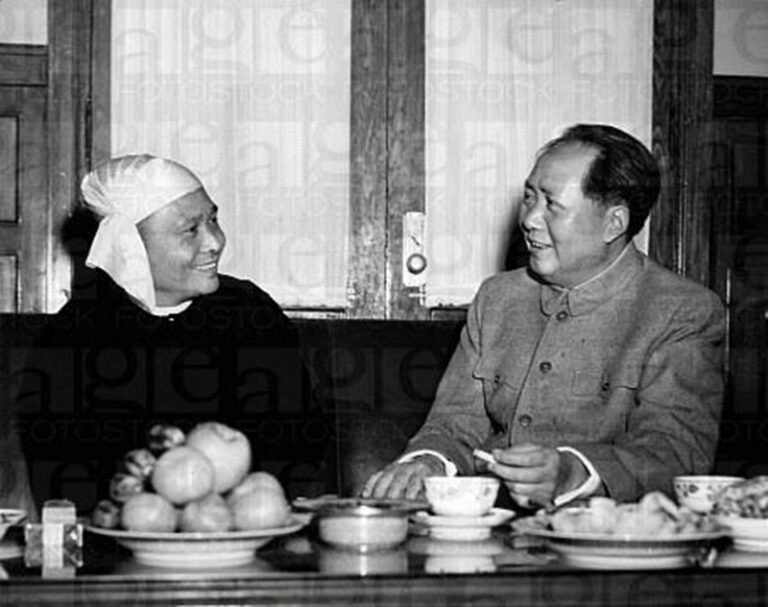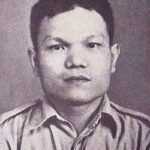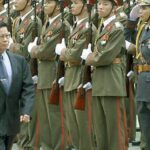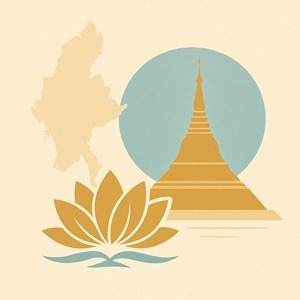
U Nu
(1907–1995)
U Nu, also known as Thakin Nu, was the first Prime Minister of independent Burma and a leading figure in the country’s struggle for freedom from British colonial rule. He was known for his commitment to democracy, Buddhism, and non-violence, and served multiple terms as Prime Minister.
Early Life and Education
Born: May 25, 1907, in Wakema, British Burma (now Ayeyarwady Region).
Educated at Rangoon University, where he became politically active.
Joined the Dobama Asiayone (We Burmans Association) and took the name “Thakin” to assert Burmese pride and anti-colonial sentiment.
Role in the Independence Movement
A close associate of General Aung San, U Nu was a member of the Anti-Fascist People’s Freedom League (AFPFL), the main political force fighting for independence.
After Aung San’s assassination in 1947, U Nu emerged as a leading figure in the movement.
Prime Minister of Burma
First Term: 1948–1956
He led the country after it gained independence on January 4, 1948. He focused on rebuilding the war-torn nation and managing ethnic insurgencies.
Second Term: 1957–1958
After briefly stepping down, he resumed office but faced political instability and a divided AFPFL.
Third Term: 1960–1962
U Nu returned to power with a strong majority and declared Buddhism as the state religion, a move that sparked discontent among non-Buddhist minorities.
Overthrow and Later Life
In 1962, General Ne Win staged a military coup, overthrowing U Nu’s government and establishing military rule.
U Nu was imprisoned and later placed under house arrest.
In the 1980s, he attempted a political comeback during a brief period of liberalization, forming a parallel government-in-exile, but it was not successful.
Beliefs and Legacy
U Nu was a devout Buddhist and incorporated Buddhist ethics into his governance.
He promoted non-violence, democracy, and spiritual values in politics.
Despite political challenges and eventual military domination, he is remembered for his role in establishing democratic foundations in post-independence Burma.
Death
Died: February 14, 1995, in Yangon, Myanmar.
Legacy
U Nu remains a respected figure for his integrity, patriotism, and commitment to democratic ideals.
His leadership contrasts with the military dominance that followed his era.
FAQ: U Nu
Who was U Nu?
U Nu (also known as Thakin Nu) was the first Prime Minister of Myanmar (Burma) and one of the key architects of the nation’s independence. He led the country after it gained freedom from British rule in 1948 and became known for his democratic ideals and promotion of Buddhist values in politics.
When and where was U Nu born?
U Nu was born on May 25, 1907, in Wakema Township, Ayeyarwady Region, British Burma. He studied at Rangoon University, where he became involved in student activism and nationalist movements during the British colonial period.
What was U Nu’s role in Myanmar’s independence movement?
During his university years, U Nu joined the Dobama Asiayone (We Burmans Association) and became active in anti-colonial campaigns. He later became a close ally of General Aung San and served in the Anti-Fascist People’s Freedom League (AFPFL), which led the struggle for independence. After Aung San’s assassination in 1947, U Nu assumed leadership and became Burma’s first Prime Minister in 1948.
What were U Nu’s main political achievements?
As Prime Minister, U Nu worked to build a parliamentary democracy, restore peace among ethnic groups, and promote Buddhism as a central part of national identity. He oversaw the drafting of Myanmar’s early constitutions and maintained the country’s neutral foreign policy during the Cold War. His government also introduced education and land reform programs aimed at reducing poverty.
Why was U Nu known as a devout Buddhist leader?
U Nu was deeply religious and believed that Buddhist principles could guide national governance. In 1961, he made Buddhism the state religion of Burma, a controversial move that reflected his belief in moral governance. He also built monasteries and supported Buddhist organizations throughout his tenure.
What challenges did U Nu face during his leadership?
U Nu’s government struggled with ethnic insurgencies, communist uprisings, and internal political divisions. Economic difficulties and administrative inefficiencies also weakened his position. Despite his peaceful intentions, his leadership faced growing opposition from both the military and political rivals.
How did U Nu lose power?
In March 1962, General Ne Win led a military coup that ended U Nu’s civilian government. U Nu was arrested and detained, marking the beginning of nearly five decades of military rule in Myanmar. After his release, he continued his political activism and attempted to restore democracy through peaceful means.
What did U Nu do after his release from detention?
Following his release, U Nu formed the Lanzin Party and later established a parallel government-in-exile during the 1980s. He traveled internationally, advocating for democracy and Buddhist ethics. Though he never regained political power, he remained a respected moral voice among pro-democracy supporters.
When did U Nu pass away?
U Nu died on February 14, 1995, in Yangon, Myanmar, at the age of 87. His passing marked the end of an era for Myanmar’s early democratic leadership.
What is U Nu’s legacy?
U Nu is remembered as a visionary and compassionate leader who tried to blend spirituality with politics. His efforts to preserve democracy, promote peace, and uphold Buddhist ethics made him one of Myanmar’s most respected historical figures. Although his policies were not always successful, his integrity and peaceful leadership continue to inspire future generations.
Why is U Nu important in Myanmar’s history?
U Nu represents Myanmar’s first experiment with democracy and the belief that faith, morality, and governance could coexist. His leadership during the early years of independence set the foundation for modern political thought in the country.




